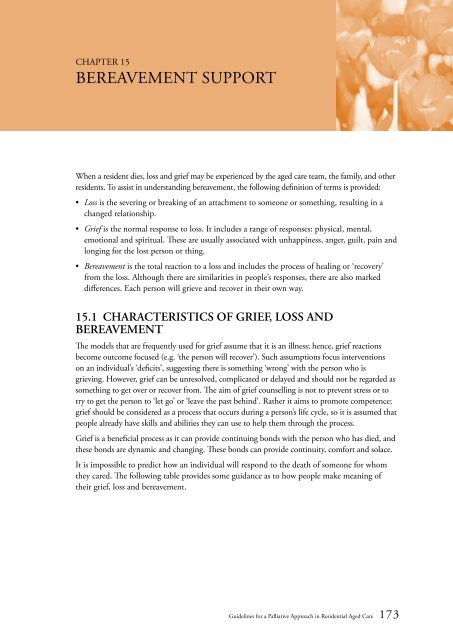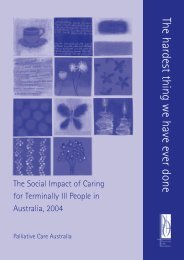Guidelines for a Palliative Approach in Residential Aged Care
Guidelines for a Palliative Approach in Residential Aged Care
Guidelines for a Palliative Approach in Residential Aged Care
Create successful ePaper yourself
Turn your PDF publications into a flip-book with our unique Google optimized e-Paper software.
CHAPTER 15<br />
BEREAVEMENT SUPPORT<br />
When a resident dies, loss and grief may be experienced by the aged care team, the family, and other<br />
residents. To assist <strong>in</strong> understand<strong>in</strong>g bereavement, the follow<strong>in</strong>g def<strong>in</strong>ition of terms is provided:<br />
• Loss is the sever<strong>in</strong>g or break<strong>in</strong>g of an attachment to someone or someth<strong>in</strong>g, result<strong>in</strong>g <strong>in</strong> a<br />
changed relationship.<br />
• Grief is the normal response to loss. It <strong>in</strong>cludes a range of responses: physical, mental,<br />
emotional and spiritual. These are usually associated with unhapp<strong>in</strong>ess, anger, guilt, pa<strong>in</strong> and<br />
long<strong>in</strong>g <strong>for</strong> the lost person or th<strong>in</strong>g.<br />
• Bereavement is the total reaction to a loss and <strong>in</strong>cludes the process of heal<strong>in</strong>g or ‘recovery’<br />
from the loss. Although there are similarities <strong>in</strong> people’s responses, there are also marked<br />
differences. Each person will grieve and recover <strong>in</strong> their own way.<br />
15.1 CHARACTERISTICS OF GRIEF, LOSS AND<br />
BEREAVEMENT<br />
The models that are frequently used <strong>for</strong> grief assume that it is an illness; hence, grief reactions<br />
become outcome focused (e.g. ‘the person will recover’). Such assumptions focus <strong>in</strong>terventions<br />
on an <strong>in</strong>dividual’s ‘deficits’, suggest<strong>in</strong>g there is someth<strong>in</strong>g ‘wrong’ with the person who is<br />
griev<strong>in</strong>g. However, grief can be unresolved, complicated or delayed and should not be regarded as<br />
someth<strong>in</strong>g to get over or recover from. The aim of grief counsell<strong>in</strong>g is not to prevent stress or to<br />
try to get the person to ‘let go’ or ‘leave the past beh<strong>in</strong>d’. Rather it aims to promote competence;<br />
grief should be considered as a process that occurs dur<strong>in</strong>g a person’s life cycle, so it is assumed that<br />
people already have skills and abilities they can use to help them through the process.<br />
Grief is a beneficial process as it can provide cont<strong>in</strong>u<strong>in</strong>g bonds with the person who has died, and<br />
these bonds are dynamic and chang<strong>in</strong>g. These bonds can provide cont<strong>in</strong>uity, com<strong>for</strong>t and solace.<br />
It is impossible to predict how an <strong>in</strong>dividual will respond to the death of someone <strong>for</strong> whom<br />
they cared. The follow<strong>in</strong>g table provides some guidance as to how people make mean<strong>in</strong>g of<br />
their grief, loss and bereavement.<br />
<strong>Guidel<strong>in</strong>es</strong> <strong>for</strong> a <strong>Palliative</strong> <strong>Approach</strong> <strong>in</strong> <strong>Residential</strong> <strong>Aged</strong> <strong>Care</strong> 173
















